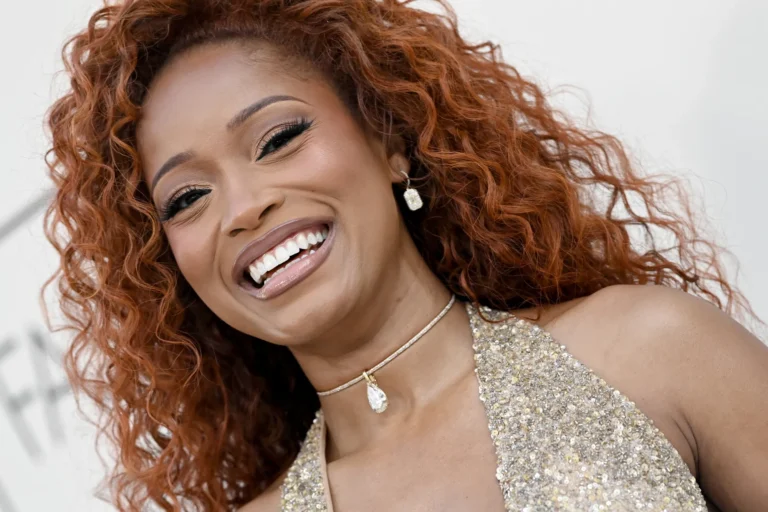Keke Palmer, the beloved actress, singer, and host of the podcast Baby, This Is Keke Palmer, is making headlines for all the wrong reasons this week. A scheduled podcast episode featuring actor Jonathan Majors mysteriously vanished before its release, sparking a wave of backlash and speculation from fans and critics alike.
The episode, initially set to premiere on April 8th, was teased last week via the Wondry app, giving fans a sneak peek into what seemed like a bold and introspective conversation. The topic? Accountability—particularly in the age of cancel culture, celebrity misconduct, and gendered double standards. The teaser’s description read:
“Accountability. It’s a loaded word, right? We’re living in a time where we want real accountability—especially for things men have gotten away with for far too long. At the same time, finding forgiveness feels harder than ever, and we’re still figuring out what true accountability even looks like.”
But when April 8th came and went, the much-anticipated episode never dropped. Instead, fans were greeted with a different conversation—an episode featuring rapper Kash Doll, with no mention of the original content featuring Majors.
The quiet swap did not go unnoticed.
Fan Outrage: Was Keke Trying to Avoid a PR Nightmare?
Social media lit up with speculation almost immediately. Why would Palmer, known for her authenticity and fearless voice, backtrack on an episode centered around such a timely and relevant theme?
For many, the issue was clear: Jonathan Majors remains one of the most polarizing figures in Hollywood following his December 2023 conviction for assault and harassment against his ex-girlfriend, Grace Jabbari. The mere idea of offering him a platform—especially on a show hosted by a prominent Black female voice like Palmer—was enough to trigger fierce reactions.
“It’s not just disappointing—it’s dangerous,” one fan wrote on X (formerly Twitter). “Giving a convicted abuser a chance to ‘explain’ himself under the guise of accountability feels like a betrayal.”
Others, however, expressed curiosity. Some fans wanted to hear Majors’ side of the story, believing the conversation could have offered valuable insight into the complexity of public redemption and the legal system’s role in it.
The Jonathan Majors Controversy: A Brief Recap
Jonathan Majors, once heralded as a rising star in Hollywood thanks to roles in Lovecraft Country, Creed III, and Ant-Man and the Wasp: Quantumania, saw his career come crashing down after serious allegations of domestic violence surfaced in early 2023.
In December 2023, Majors was convicted of misdemeanor assault and harassment following a physical altercation with his then-girlfriend, Grace Jabbari. The case dominated headlines, especially as Majors maintained his innocence throughout the trial.
Further complicating his public image, a disturbing audio clip recently resurfaced, in which Majors can be heard acknowledging that he strangled Jabbari while stating, “I’d never [been] aggressive with a woman before.” This audio reignited public criticism and sparked new conversations about how abusers manipulate narratives to protect their careers.
In a March 2024 interview with Complex, Majors hinted at personal growth following the trial, saying:
“I was so grateful that I had done my work, you know? And I’m continuing to do my work.”
Yet, for many, those words rang hollow, especially given the severity of the allegations and the fresh resurfacing of audio evidence.
The Power of the Platform: Should Abusers Be Given a Mic?
Keke Palmer’s decision to bring Majors on her podcast—then quietly remove the episode—has opened a wider dialogue around the responsibility of media figures in platforming controversial celebrities.
Palmer has long been celebrated for her ability to blend humor, honesty, and activism. Her podcast often dives into tough conversations that explore modern culture, gender roles, and the evolving dynamics of fame. But this time, critics say she missed the mark.
“There’s a big difference between accountability and giving someone a soft landing,” wrote one entertainment journalist on Instagram. “If Majors was truly held accountable, he wouldn’t be on a podcast explaining why he deserves forgiveness.”
As of now, Palmer has not issued any statement regarding the removed episode or commented on whether it will be released at a later date. The silence is only adding fuel to the fire.
Industry Impact: A Growing Trend of Accountability or Selective Silence?
This incident reflects a larger trend in Hollywood and the entertainment industry: the tension between cancel culture and redemption arcs. Can someone be held accountable and still maintain a career? Who gets to come back from scandal—and who doesn’t?
Stars like Will Smith, Kanye West, and even Chris Brown have all faced public fallout over the years, yet their trajectories have varied dramatically. The Palmer–Majors controversy is just the latest example of how celebrity forgiveness remains inconsistent—and often influenced by race, gender, and public relations strategy.
There’s also the question of transparency. Had Palmer addressed the removal publicly and explained her intentions, fans might have responded differently. But the lack of communication has created a vacuum where speculation thrives.
Final Thoughts: A Missed Opportunity for Real Dialogue?
Ultimately, Keke Palmer’s decision to shelve the Jonathan Majors episode—without explanation—has left fans disappointed and confused. In a cultural moment begging for nuanced discussions around abuse, accountability, and fame, this could have been a moment to push the envelope.
Instead, what was positioned as a bold conversation on “accountability” has turned into a PR crisis.
Whether the episode ever sees the light of day remains to be seen. But one thing is certain: Keke Palmer is now at the center of a conversation she may have tried to avoid—and the internet isn’t letting it go.


